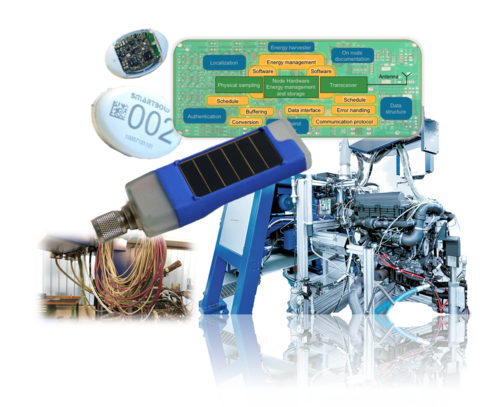Publications: See FoDok, opens an external URL in a new window
Start of project: 01.03.2016
End of project: 30.04.2019
Development, production and final testing of complex systems (e.g. hybrid power trains of vehicles) require precise sensors for industrial use. Today usually cables provide energy and communication capability to sensors, which requires a cumbersome cabling and configuration process. Thus, cable-based sensors and measurement equipment are not well suited for flexible and frequently changing applications. It follows, that the use of wireless sensor networks (WSN) is a prerequisite for future intelligent flexible production (“Industry 4.0” or “cyber physical systems”). Currently available WSN solutions, however, are merely capable of providing the required data rates, low cycle times, low latency and high reliability for industrial use. Project FASAN should make distinct progress by developing intelligent energy efficient wireless sensors for capturing highly dynamic signals operated in flexible networks for complex measurement tasks in industrial applications.
Based on results from preceding research projects (COMET and FP7) the sampling rate, real-time capability, transmission reliability, energy efficiency, and coordination of nodes for such WSNs should be further improved to be able to show by means of a prototype, the technical and economic feasibility for demanding and complex industrial measurement tasks. The demonstration system should comprise the operation of two WSNs in parallel with a total of 150 sensor nodes and 10 base stations. The nodes should sample their sensor signals at a rate of up to 10 Hz. They should operate on a solar cell continuously. The nodes should adapt their functionality and their networking to the actual production step. In addition it should be able to locate the sensors, such that the mapping of sensor value to a certain measured physical signal can be automated. For this an optical localization system, whose functional principle has already been shown, should be further developed and optimized towards industrial use.
In a further step FASAN will investigate the possibility of wireless ad-hoc interaction between sensors and measurement equipment. These devices should make their own functionality available to others, such that flexible cooperation, based on cyclic real-time wireless communication, can generate added values such as e.g. virtual sensors. This should be performed in an automated way without human interaction.
Our partners:
https://www.lcm.at, opens an external URL in a new window
https://www.avl.com/, opens an external URL in a new window
This project is supported by the Austrian Research Promotion Agency (FFG) under grant number 853456.
https://www.ffg.at/en, opens an external URL in a new window


